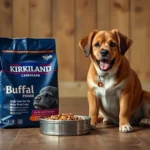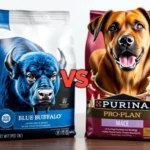
Introduction
When it comes to ensuring the health and well-being of our furry friends, understanding dog nutrition is essential. Just like humans, dogs require a balanced diet to thrive, which includes the right mix of proteins, fats, carbohydrates, vitamins, and minerals. With the rise of pet-friendly treats and snacks, many pet owners wonder about various human foods and their safety for dogs. One such treat that often comes up is sherbet. Can dogs eat sherbet? Is it safe, or does it pose any health risks? In this article, we will delve into the nutritional implications of sherbet for dogs, exploring whether it’s a suitable treat or if there are better alternatives available.
Understanding Dog Nutrition
The Basics of Canine Diet
A balanced diet is crucial for dogs to maintain optimal health. Dogs are omnivores, meaning they can consume a variety of foods, but certain nutrients are vital for their overall well-being. Here are the essential nutrients that should be part of a dog’s diet:
- Proteins: Vital for growth, muscle development, and tissue repair.
- Fats: Necessary for energy, skin health, and nutrient absorption.
- Carbohydrates: Provide energy and help with digestion.
- Vitamins and Minerals: Support various bodily functions, including immune response and bone health.
An ideal diet comprises a mix of these nutrients, ensuring that your dog remains healthy and active.
Common Human Foods for Dogs
While many human foods are safe for dogs, others can be harmful. Here’s a quick guide:
- Safe Foods: Carrots, peanut butter, pumpkin, plain cooked chicken, and certain fruits like apples and blueberries.
- Unsafe Foods: Chocolate, onions, garlic, grapes, and anything with high sugar or fat content.
Even with safe foods, moderation is key. Treats should not make up more than 10% of your dog’s daily caloric intake to avoid nutritional imbalances.
What is Sherbet?
Ingredients Typically Found in Sherbet
Sherbet is a frozen dessert that often contains a combination of the following ingredients:
- Sugar: A primary ingredient in most sherbet recipes, contributing to its sweet taste.
- Dairy: Many sherbet varieties contain milk or cream, which can be problematic for lactose-intolerant dogs.
- Artificial Flavors and Additives: Some commercial sherbets include artificial ingredients that may not be suitable for dogs.
Given these components, it’s essential to scrutinize the ingredients before sharing sherbet with your pet.
Nutritional Profile of Sherbet
The nutritional profile of sherbet can vary significantly based on the brand and recipe. Typically, sherbet contains:
- Calories: Usually higher than sorbet due to the sugar and dairy content.
- Carbohydrates: Primarily from sugars, which can lead to energy spikes in dogs.
- Fats: Generally lower than ice cream but can still contribute to unwanted weight gain.
When comparing sherbet to other frozen treats like ice cream and sorbet, it’s clear that while sherbet may seem like a lighter option, the sugar content can still be quite high.
Can Dogs Eat Sherbet?
Potential Risks of Feeding Sherbet to Dogs
While the thought of sharing a cool treat like sherbet with your dog may seem harmless, there are several risks to consider:
- High Sugar Content: Sherbet is often loaded with sugar, which can lead to obesity, dental issues, and even diabetes in dogs.
- Lactose Intolerance: Many dogs are lactose intolerant, meaning they lack the enzyme needed to digest dairy properly. Consuming sherbet could lead to gastrointestinal upset, including diarrhea and vomiting.
- Artificial Ingredients: Some sherbets contain artificial flavors, colors, and preservatives, which may cause adverse reactions in sensitive dogs.
Before offering sherbet to your dog, consider these potential risks seriously.
Signs of Adverse Reactions
If you decide to give your dog sherbet, it’s crucial to monitor them for any signs of adverse reactions. Symptoms to watch for include:
- Vomiting
- Diarrhea
- Bloating
- Lethargy
- Itching or skin irritation
If you notice any of these symptoms after your dog consumes sherbet, it’s best to consult your veterinarian for guidance.
Healthier Alternatives to Sherbet
Dog-Safe Frozen Treats
Instead of sharing sherbet, consider making homemade frozen treats specifically designed for dogs. Here are a couple of simple recipes:
- Frozen Yogurt and Fruit Pops:
- Mix plain, unsweetened yogurt with dog-safe fruits like bananas or blueberries.
-
Pour the mixture into ice cube trays or silicone molds and freeze.
-
Pumpkin and Peanut Butter Frozen Treat:
- Combine canned pumpkin with a small amount of peanut butter.
- Pour into molds and freeze for a nutritious and tasty treat.
Benefits of Healthy Treats
Choosing dog-safe frozen treats over sherbet not only avoids potential health risks but also provides nutritional benefits. Healthy treats can:
- Offer vitamins and nutrients that support your dog’s health.
- Help maintain a healthy weight when incorporated into a balanced diet.
- Serve as a fun way to keep your dog cool during hot weather.
Expert Opinions on Canine Treats
Veterinarian Insights
Veterinarians often advise against feeding dogs human foods, especially those that are high in sugar or contain dairy. They recommend focusing on treats specifically formulated for dogs, as these products are designed to meet their nutritional needs without the added risks.
Pet Nutritionist Recommendations
Consulting with a pet nutritionist can provide tailored advice for your dog’s diet. They emphasize the importance of balanced nutrition and suggest that treats, including frozen ones, should be healthy and low in calories. Key takeaways from pet nutrition experts include:
- Always read ingredient labels to avoid harmful substances.
- Choose treats based on your dog’s individual dietary needs and health conditions.
- Use treats as rewards or training aids, ensuring they complement your dog’s overall diet.
Conclusion
Understanding dog nutrition is crucial for any pet owner, especially when considering treats like sherbet. While it may be tempting to share this frozen dessert, the potential risks—including high sugar content and dairy-related issues—outweigh the benefits. Instead, opt for healthier alternatives that are safe and nutritious for your dog. By prioritizing their dietary needs, you can ensure your furry friend remains healthy, happy, and well-nourished.
FAQs
Can dogs eat other types of frozen desserts?
While some frozen desserts may be safe, many contain high sugar levels or ingredients harmful to dogs. Always check labels and opt for dog-safe frozen treats.
What should I do if my dog eats sherbet?
Monitor your dog for any signs of gastrointestinal distress. If they exhibit symptoms like vomiting or diarrhea, consult your veterinarian for advice.
How often can I give my dog treats?
Treats should make up no more than 10% of your dog’s daily caloric intake. Always consider their overall diet and health when incorporating treats.
Are there any fruits that dogs can safely enjoy?
Yes, many fruits are safe for dogs, including apples (without seeds), blueberries, watermelon, and bananas. However, always introduce new foods gradually and in moderation.
References
- Veterinary Nutritional Guidelines
- Canine Nutrition Research Studies
- Pet Health Websites and Articles









